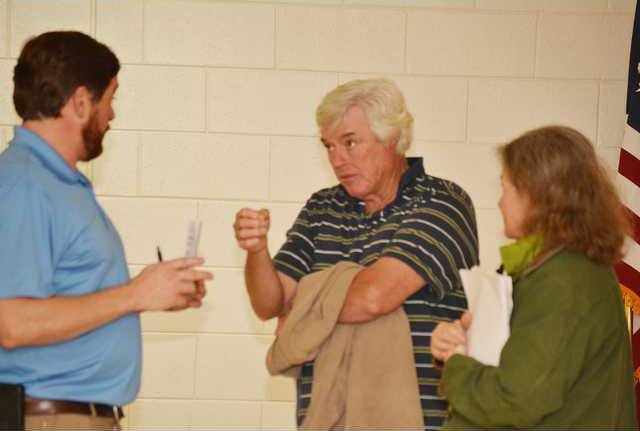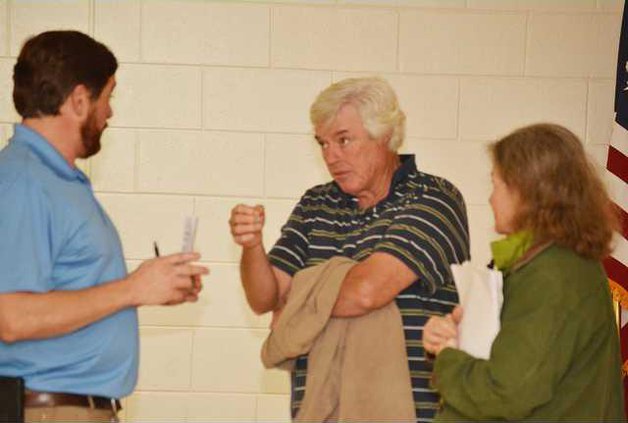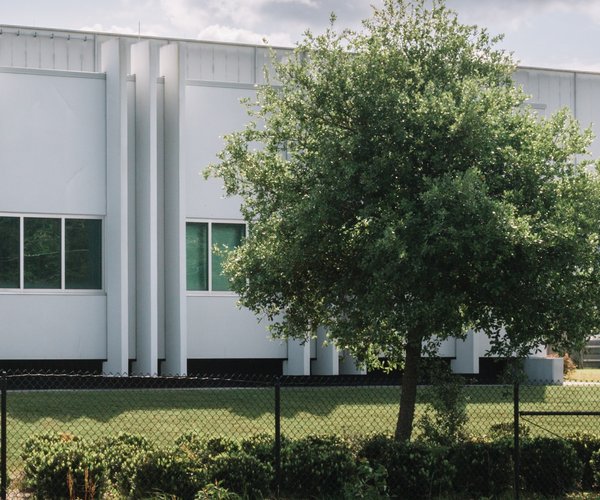In a near-unanimous voice, attendees at a state Environmental Protection Division public hearing on Guyton’s proposed wastewater treatment plant expressed their displeasure and opposition.
The city is planning to build a 250,000-gallon-per-day sewage treatment plant on land it purchased off Riverside Drive. Construction costs are estimated to be $4.7 million and connecting the city’s customers to the plant is expected to cost $2 million.
Effingham County commissioners reiterated their hope that the city will buy capacity in the county’s 1 million-gallon-per-day plant. Five of the six commissioners were in attendance, as was County Administrator David Crawley, and county officials presented the city with another letter restating their wish to work together on sewage treatment lines.
First District Commissioner Forrest Floyd said protecting the Ogeechee River was one of his campaign platforms and urged Guyton officials to seek connecting with the county’s system.
“There is an alternative,” he said. “We still would like to work something out with the city of Guyton. It would help the city and it would help the county.”
Third District Commissioner Steve Mason said the board is “100 percent unanimous” in working with the city for a wastewater treatment agreement. He also said the cost of connecting to the county’s system could be offset through increased customers.
“The county has lots of capacity. The city of Guyton needs it,” he added. “The county of Effingham does not need another wastewater treatment plant in it. We have plenty now.
We are here to show the door is still open. We want the public and the city of Guyton to know we are still opening our door to make this connection.”
The county has offered a price of $2.8 million for 250,000 gallons of capacity in its plant and estimates connecting to the county’s lines will cost an additional $2.4 million. According to a terms sheet sent to the city, the county also would charge the city $2.07 per 1,000 gallons for wastewater treatment, which is less than the rate Guyton pays to Springfield to treat its wastewater. The county also would guarantee that rate would not exceed the current rate being paid to Springfield for four years.
Emily Markesteyn of the Ogeechee Riverkeeper also pleaded with the city to connect to the county’s system.
“The city of Guyton does not need to build a new wastewater treatment facility or sprayfield for land application,” she said. “The city of Guyton’s wastewater can and should be tied into Effingham County wastewater reclamation facility. Effingham County’s facility has the capacity and they are ready and willing to receive the city of Guyton’s wastewater.
“There is no valid reason for a new wastewater treatment facility and sprayfield to be constructed when there is an alternative means that is feasible and available to handle Guyton’s wastewater in a proper manner.”
The public hearing was set up to receive comments on water quality issues pertaining to the city’s draft permit for a wastewater treatment plant land application system. Many speakers said the water quality in the nearby Ogeechee River is bad enough and the area proposed for the sprayfield is susceptible to flooding — and that means runoff into a river still damaged from the May 2011 fish kill.
“If this water is going to be in any way going into the Ogeechee River, I vote no,” said Alfred Driggers.
Jamie Tucker said it’s not a matter of if there will be a flood but rather when.
“I have seen the creek flood on my property and it will go to the Ogeechee River,” she said. “It’s just a matter of when it will get to the river.”
She also asked what a potential flood to the sprayfield area would do to her well.
“What will it do to my drinking water?” Tucker inquired. “Will Guyton come test my water to make sure? Will I be able to drink my water when it floods?”
Asked Wayne Carney: “How much filth is going to be enough? The river is already on the edge of being dead.”
Concerns over flooding
Emily Markesteyn of the Ogeechee Riverkeeper also voiced her organization’s opposition to approving Guyton’s sprayfield permit. The proposed sprayfield is within a FEMA-designated flood zone, according to FEMA flood insurance maps, Markesteyn said.
“The Ogeechee River basin cannot afford to receive any more pollution,” she said. “Because the area is prone to flooding, it is dangerous to allow effluent to be sprayed on land where it can reach water sources used for recreation and drinking.”
Connie and James Hayes, who own a Bulloch County organic farm across the river from the treatment plant’s proposed site, expressed their frustration over the EPD process since many of the comments aired Thursday night echoed the sentiments over King America Finishing. The Screven County-based textiles plant had been discharging into the river without a permit to do so for five years, and residents and landowners along the Ogeechee have pointed at King America as the culprit for the May 2011 fish kill.
“I’m tired of coming to these meetings,” said Connie Hayes. “They’re the same thing. It doesn’t matter what entity is wanting to dump into the river; if it’s poison being dumped into the river, we’re all suffering. We care, and we don’t want to put up with that.
“They need to stop giving permits and the same objections being waged here are the same objections about King America being allowed to dump as they please. They’re still doing it and they still haven’t been stopped. Somebody has to stop something somewhere.”
“What is happening with King America is what is going to happen here,” warned Henry Morgan. “This thing goes right by Shrimp Creek, and your stuff is going to be coming into our river. This plant is going to be in a place it doesn’t need to be, and you’ve got a perfectly good plant in the middle of the county that needs customers.”
Hayes also said she was “appalled” that such a small room could hold all the people objecting to the permit.
“I want to know where the citizens of the city of Guyton are,” she said.
“If I was a citizen of the city of Guyton,” said James Hayes, “I’d be raising all kinds of hell, because I’ve got to pay for it. They have to realize what their taxes are going to do to pay for this.”
Financial pipes’ dreams?
Guyton had a bond package of more than $9 million approved in 2011. From the bond proceeds, the city plans to use $2 million for its land purchase, $2 million for the pipes need to carry customers’ waste to the plant and $4.7 million for the plant and sprayfield.
The plant’s plans call for it to be built 65 feet above sea level and for 40 of the available 200 acres to be used as a sprayfield.
Craig Barrow, a Chatham County resident who owns land on Riverside Drive adjacent to where the treatment plant and sprayfield are planned, also called into question the city’s financial footing for its intentions. Barrow said he told Guyton officials and Hofstadter and Associates, the engineering firm designing the plant, that their projections were “hogwash.”
“They were projecting 80 hookups a year,” Barrow said. “I said they would be lucky to get one.”
Barrow further explained that Riverside Drive and Guyton residents remembered the floods of 1948, 1966, 1980 and 1998 and have told the city and its consultants the proposed plant’s location lies within the 100-year flood plain. He also said there are six wetlands on the site, and the city has failed to disclose two jurisdictional wetlands, which fall under federal control.
“The proposed design is clearly, clearly not in compliance with federal laws as they pertain to jurisdictional wetlands,” he said. “I have substantial evidence from eminent, qualified consultants that the proposed system could be very damaging to the site, the neighboring property and in particular the Ogeechee River.”
Morgan questioned Guyton City Alderman Ulysses Eaton about the plant’s costs and what the costs would be in case of a breakdown at the plant. Eaton deflected all questions about the costs.
“You’re hiding just like y’all hid when you bought the property, and you paid too much for it,” Barrow charged. “And they don’t even care to come here and listen to our comments. That tells you this is a bad deal. Y’all need to go back and do your jobs and deny this permit. It’s inexcusable that they won’t even answer one question.”
The EPD will take public comments until Jan. 17, and the state could grant a permit within 30 to 60 days, according to Jeff Larson, assistant chief of the watershed protection branch for the Savannah and Ogeechee river basins. Once a permit is issued, the city can start construction. Larson added the state previously has turned down permit requests.
“We would not have gone ahead with the draft permit if we didn’t feel confident in the science or the location and being protective of the river,” he said. “But that’s why this is a public process. Additional information is always helpful.”
James Hayes, however, warned that residents and neighbors may be at their edge with the river’s safety.
“I’m to the point where I’m like an animal that you back into a corner,” he said. “We’ve been pushed about as far as we’re going to be pushed. You back an animal into a corner, he’ll come out after a while, and he’ll hurt you on the way out.”









